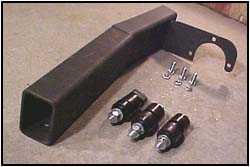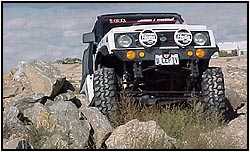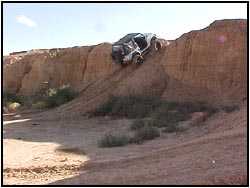
 Installing the 'SuperBeef' Transfer Case
Mounting Kit From Rocky Road Outfitters Installing the 'SuperBeef' Transfer Case
Mounting Kit From Rocky Road Outfitters
by Bill Johnston
 The transfer case on a Suzuki Samurai is
secured to the vehicle frame by two mounting arms. The drivers side uses
a short arm, mounted at an angle and running from side to side (drivers
side to passenger side). The long arm is mounted on the passenger side
and runs from front to rear. The transfer case on a Suzuki Samurai is
secured to the vehicle frame by two mounting arms. The drivers side uses
a short arm, mounted at an angle and running from side to side (drivers
side to passenger side). The long arm is mounted on the passenger side
and runs from front to rear.
 With a stock engine/transmission and
gears these arms take quite a bit of abuse. But when you add bigger
(more aggressive) tires, lower gears and maybe some 'oomph' to your
engine these arms tend to twist and knock your drive train geometry out
of whack. Have you ever found that your t-case shifter wouldn't go into
(or come out of) gear? Maybe it looks like it's leaning over a little
more than normal... check underneath and see if one of the arms have
bent. Take a good look at that long arm, it is probably the culprit. With a stock engine/transmission and
gears these arms take quite a bit of abuse. But when you add bigger
(more aggressive) tires, lower gears and maybe some 'oomph' to your
engine these arms tend to twist and knock your drive train geometry out
of whack. Have you ever found that your t-case shifter wouldn't go into
(or come out of) gear? Maybe it looks like it's leaning over a little
more than normal... check underneath and see if one of the arms have
bent. Take a good look at that long arm, it is probably the culprit.
First Problem
The arm that is most susceptible to bending is the
long (or passenger) arm. It will do more of a 'twist' than a bend, and
it may not be evident until you get right up under the rig for a closer
look. The original arm in the photo below has about a 25 degree twist in
it that was caused by aggressive tires and a penchant for rock crawling.
I felt some driveline shake and couldn't figure out the cause. Then I
removed the arm and saw the twist. Ouch! I replaced it with a first
generation beefed up unit from Rocky Road Outfitters (RRO). This heavy
duty unit has served the Zook well for the last year. But upon removal
for this installation, we noticed a 15 degree twist that wasn't visible
while on the vehicle.
Second Problem
When doing aggressive trails and difficult obstacles
another problem creeps up. Have you felt the shifter to be a little
loose, maybe it moved around more than usual. Check to see if you are
moving the whole transfer case around. Have a friend look underneath
while you are running the shifter through its pattern while stopped. Or
even better, shut off the motor and crawl underneath the vehicle (use
the emergency brake - remember safety first!) and push the unit around
with your hand to see if the entire unit is loose. The rubber mounts
that hold the arms to the frame may be tight, but the bolts that hold
the long arm to the transfer case may be loose.
Remember this is an aluminum case, so you have to be
careful how tight you torque the bolts down. But (again) after
aggressive terrain the stress and vibration can get the best of the
aluminum mounting point and work the bolts loose. This is when you need
something else that can secure the transfer case from a second angle (a
second plane, if you will).
Solution
 We installed the new 'Super Beefy'
Mounting Kit from Rocky Road Outfitters to cure both problems at once.
In the photo to the right, we have a stock unit on the left, a first
generation beefed RRO unit in the center, and the SuperBeef Mounting Kit
on the right. As you can see in the picture, the SuperBeef unit looks a
little different as it holds the case from two sides instead of just
one. You should also note the entire unit is made from .25" wall steel
to fight the twisting forces that the transfer case will hit it with. We installed the new 'Super Beefy'
Mounting Kit from Rocky Road Outfitters to cure both problems at once.
In the photo to the right, we have a stock unit on the left, a first
generation beefed RRO unit in the center, and the SuperBeef Mounting Kit
on the right. As you can see in the picture, the SuperBeef unit looks a
little different as it holds the case from two sides instead of just
one. You should also note the entire unit is made from .25" wall steel
to fight the twisting forces that the transfer case will hit it with.
 Installation was very straight forward
once you got the tools out and the iced tea poured. First jack up the
transfer case enough to take the weight off of the mounts, and then
remove the nuts that hold the rubber mounts to the frame. The case
itself is light enough to move around freely, but a jack stand and a
piece of wood help take the stress out of your arms. Installation was very straight forward
once you got the tools out and the iced tea poured. First jack up the
transfer case enough to take the weight off of the mounts, and then
remove the nuts that hold the rubber mounts to the frame. The case
itself is light enough to move around freely, but a jack stand and a
piece of wood help take the stress out of your arms.
Then remove the four bolts that hold the arm to the
case and remove the arm. Take a look at the arm you have just removed.
If you are lucky and it is still straight then you have a spare for your
'emergency box'. Installing the SuperBeef arm will probably make using
the spare unnecessary, but other friends on the trail may be very
grateful to you for having it when they tear up their stock unit. This
is what will happen to the unit we just replaced.
 The fit of the new long arm is very
tight to the case. We had to tighten down the three bolts that fit into
the holes around the rear drive shaft output flange before the four side
bolts would line up. It was an exact fit. When you first see the empty
holes around the flange, you might think that maybe you lost a part...
(Why are these holes here?) but they were actually a hold-over from an
earlier model that used a transfer case mounted emergency brake. The fit of the new long arm is very
tight to the case. We had to tighten down the three bolts that fit into
the holes around the rear drive shaft output flange before the four side
bolts would line up. It was an exact fit. When you first see the empty
holes around the flange, you might think that maybe you lost a part...
(Why are these holes here?) but they were actually a hold-over from an
earlier model that used a transfer case mounted emergency brake.
 We had to loosen both transfer case
arms at the frame to allow enough 'wiggle room' to get to the four bolts
on the middle of the long arm to tighten them down during the
re-install. We tried it with the short arm still attached to the frame
the first time and you can see how little space it left us on the
right. We had to loosen both transfer case
arms at the frame to allow enough 'wiggle room' to get to the four bolts
on the middle of the long arm to tighten them down during the
re-install. We tried it with the short arm still attached to the frame
the first time and you can see how little space it left us on the
right.
 When you use the poly mounts to secure
the unit to the frame, pay close attention to the shape of the mounts.
One of the poly bushings has been trimmed for the close fit on the rear
of the long arm. The picture to the left shows where this 'clipped'
bushing is used. The kit has a full set of directions to lead you
through the assembly of the kit, but as you can see here it is a fairly
simple task. Just make sure you tighten the mounts as per the directions
and you should have no problems. When you use the poly mounts to secure
the unit to the frame, pay close attention to the shape of the mounts.
One of the poly bushings has been trimmed for the close fit on the rear
of the long arm. The picture to the left shows where this 'clipped'
bushing is used. The kit has a full set of directions to lead you
through the assembly of the kit, but as you can see here it is a fairly
simple task. Just make sure you tighten the mounts as per the directions
and you should have no problems.
Our Review
 As with all my reviews, I took a
trip out to the trails to see if the product will stand up to the abuse
I am known for. Rock crawling and hill climbing can be tough on a drive
train if you really 'go for it', so we headed for the 'Proving
Grounds'. I don't think we could have harmed the arm if we took a
sledgehammer to it, but we tried... As with all my reviews, I took a
trip out to the trails to see if the product will stand up to the abuse
I am known for. Rock crawling and hill climbing can be tough on a drive
train if you really 'go for it', so we headed for the 'Proving
Grounds'. I don't think we could have harmed the arm if we took a
sledgehammer to it, but we tried...
 As in all of the equipment I have
seen from Rocky Road, straight out of the box this bracket looks like is
made to handle the stress. The arm is built for strength and it showed.
Remember when we said the transfer case is made of aluminum? Take this
to heart folks. Although the arm can take the punishment, the case
can't. So get a good skid plate to protect the case and let the
SuperBeef Transfer Case Mounting Arm keep everything from twisting up
and coming loose. As in all of the equipment I have
seen from Rocky Road, straight out of the box this bracket looks like is
made to handle the stress. The arm is built for strength and it showed.
Remember when we said the transfer case is made of aluminum? Take this
to heart folks. Although the arm can take the punishment, the case
can't. So get a good skid plate to protect the case and let the
SuperBeef Transfer Case Mounting Arm keep everything from twisting up
and coming loose.
|
I originally wrote
this article for
www.off-road.com as a product review. I have
received email telling me it could not be found.
The article is no longer available there, so I published my copy here.
|
|